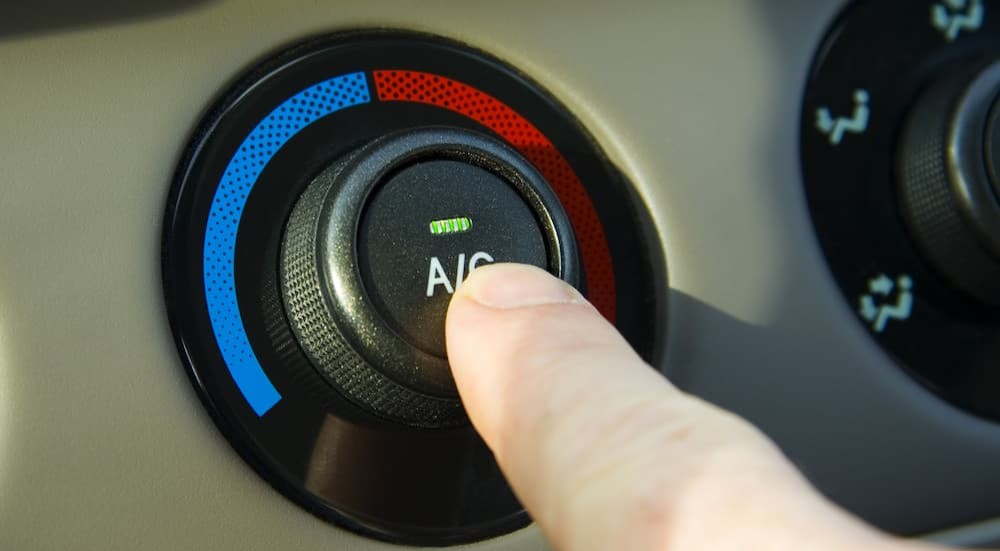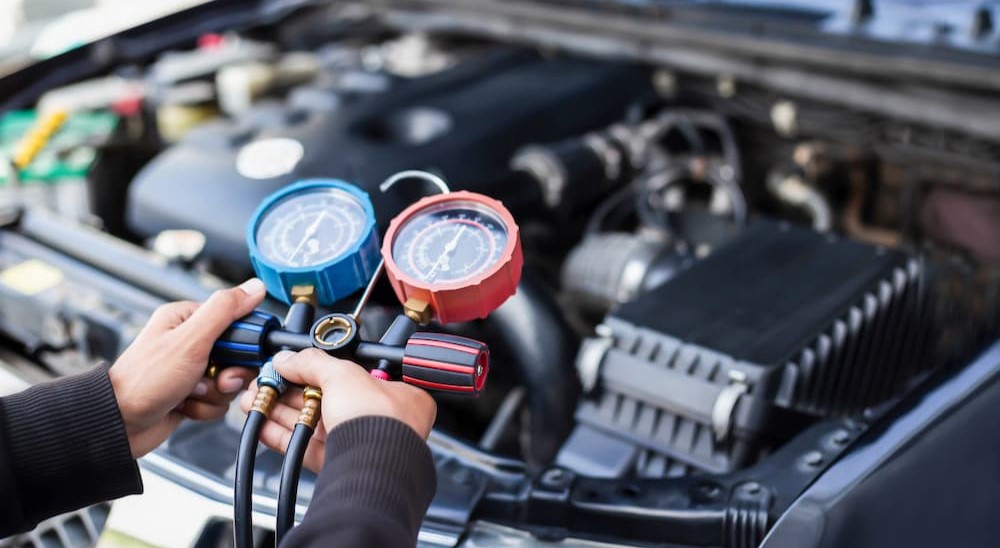It isn’t until we’re desperately looking for car AC repair near me that we give much thought to the system that keeps us cool behind the wheel. By then, it’s too late, and we’re either faced with an air conditioner that doesn’t work and blows warm air, or one that smells or sounds funny. It spells disaster, but it doesn’t have to be if you know how your air conditioner works and the potential signs of trouble.

AC Basics: How Your Car’s Air Conditioner Works
Think of your car’s air conditioner like your circulatory system, which relies on the heart to pump blood through your veins. The heart of your air conditioner is the compressor. Its blood is the refrigerant, which is remarkable because it can transition between a liquid and gas state. How does this magic happen?
The refrigerant starts as a cool, low-pressure gas until it reaches the compressor. This is the workhorse of the operation, a pump driven by a belt attached to the engine’s crankshaft. As the low-pressure gas reaches the compressor, it compresses and forces the gas toward the condenser under high pressure. This compression of the gas generates heat, but the condenser cools the refrigerant down enough to turn it into a high-pressure liquid.
Depending on the system, the high-pressure liquid flows through the receiver/dryer or accumulator, where desiccants filter moisture out of the refrigerant. Think of these desiccants like the small packets (marked “do not eat”) that you find in shoeboxes or other packages that attract water to keep items fresh. It’s the same concept, but the desiccants in the air conditioner prepare the refrigerant for the evaporator.
As the high-pressure refrigerant leaves the receiver/dryer, the low-pressure part of the process begins with what’s called the thermal expansion valve or, on modern vehicles, an orifice tube. The expansion valve/orifice tube lets the high-pressure refrigerant expand, regulating the flow as it moves toward the evaporator. Where the compressor is the heart of the system, the evaporator is where the real magic happens because it’s the final part of the process that distributes cool air throughout the cabin. Think of it as the last curtain call in the system.
The refrigerant flows into the evaporator as a low-pressure liquid, meaning its boiling point is incredibly low. The evaporator draws in warmer air from the cabin, making the refrigerant boil and return to its gaseous state to absorb heat. Then, the remaining cold air is distributed by a fan into the cabin, while the refrigerant gas returns to the compressor. The process starts over, absorbing heat from inside your car and radiating it to the outside..

Signs Your AC Compressor Is Bad
The compressor is the heart of your car’s air conditioning system, with every component relying on it to initiate the process of turning the refrigerant from a gas into a liquid. As a result, any issue with the compressor can cause a chain reaction that can dramatically impact how your car’s AC performs. What are some indicators that your compressor is bad and it’s time for service?
1. Unusual Sounds
Your air conditioner should work quietly in the background, meaning any rattles or squeaks are signs of concern. Like the rest of the air conditioner, the compressor relies on several components, such coils and ball bearings. Over time, these components can break or malfunction, causing the system to make unusual sounds when operating. An occasional click as the compressor turns on and off is normal, but other noises like squeaks, whistles, and grinds are not.
2. A Steady Stream of Hot Air
Under normal circumstances, your air conditioner will blow cool air out your vents. However, that cool air can become a steady stream of warm or hot air. This hot air can indicate several issues with your air conditioner, like low refrigerant levels. Technicians will typically check this first, eliminating the easiest possibility. Then, if the system continues to blow hot air, they know it’s an issue with the compressor, because there’s nothing to initiate the process that turns the refrigerant from a gas into a liquid to generate cool air.
3. Leaking Fluid
Leaking fluid is never a good sign, and the same is true for a leaky compressor. Compressor leaks are common around the seal, gaskets, O-rings, and hoses but can be difficult for many drivers to find. Technicians often use electronic leak detectors or a special dye to determine the location of the refrigerant leak.
This is not to be confused with a puddle of ordinary water under your vehicle while or soon after running your AC. This is perfectly normal, the result of the condenser doing its job and releasing heat to the outside world. As its name suggests, moisture in the air can condense on this component, then drip to the ground, creating a puddle. As long as this puddle is clear in color, it is water and nothing to worry about.
4. Stuck Compressor Clutch
The compressor relies on a clutch, belt, and pulley to connect it to the engine’s crankshaft. The clutch minimizes wear and tear on the compressor by cycling on and off, which also ensures the engine works more efficiently when you’re not running the air conditioner. However, this clutch can get stuck in the on or off position, neither of which is good for the system.
Extending the Life of Your Car’s AC Compressor
Diagnosing a faulty compressor in your car’s air conditioner is relatively straightforward because the system typically blows hot air or produces unusual noises. However, there are several steps you can take before your compressor gets to this point of failure. It’s what we call “proactive maintenance” that can extend the life of your car’s air conditioner and minimize your repair expenses.

Replace the Cabin Air Filter Regularly
The cabin air filter is designed to ensure the air inside the cabin is free of pollutants, but it also plays a critical role in your car’s air conditioning system. How so? A dirty air filter can’t adequately filter pollutants which, in extreme cases, can cause breathing problems when you’re in the cabin. At the same time, a clogged filter forces the air conditioner to work harder, adding extra wear and tear to the compressor and the other components that are critical to keeping your vehicle cool. Replacing the filter every few months mitigates this risk, and ensures that air freely flows throughout the system as it should.
Opt for Routine Inspections
One of the easiest ways to extend the life of your compressor and heighten its performance is to opt for routine inspections by a trusted mechanic. While you know the warning signs of a failed compressor, technicians are overly familiar with the setup and can inspect components like the compressor belt to ensure it’s tightened correctly. They’ll also check the coolant levels and hoses, replace the compressor oil as needed, or recharge the system. This comprehensive inspection gives you more insight into the air conditioner’s condition and helps extend the longevity of critical components like the compressor.
Stay Vigilant and Be Mindful of the Conditions
As you reach for the dial on the air conditioner, be mindful of what you’re asking the system to do as you navigate the road. Are you trying to quickly cool off your car during a blazing summer heat wave? While it’s easy to expect the air conditioner to respond instantly, extreme conditions can cause a slight delay as the system requires higher pressure to operate effectively. At the same time, frigid temperatures can cause the lubricants to thicken and the components to stiffen, requiring them to work harder than usual.
Knowing how your air conditioner works and being mindful of the conditions are two integral steps in ensuring your car’s air conditioner runs efficiently and does its best to keep you and your passengers cool. As always, be aware of the common symptoms of a failed compressor and recognize when it’s time to bring your car in for service.

